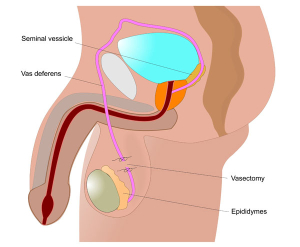No-Scalpel Vasectomy Surgeon

Are you considering a vasectomy? Did you know a recent advancement has been made with the development of the no-scalpel vasectomy? The no-scalpel vasectomy has revolutionized the original vasectomy technique. No scalpel vasectomy surgeon, Dr. Mark Allen offers this procedure for patients in Plano as a simple, effective, and relatively pain-free method for providing permanent contraception.
For more information, contact Dr. Allen’s team today!
No-Scalpel Vasectomy Overview
A vasectomy is a surgical procedure that has been successfully used as a male birth control option in countless men living in the Plano, Frisco and Dallas, Texas area. In this procedure, the tube (vas deferens) leading from each testicle is cut and sealed off. By simply cutting the vas deferens, sperm can no longer reach the prostate where it would normally mix with semen and potentially cause a pregnancy in his female partner. Dr. Mark Allen, board certified urologist, specializes in the no-scalpel vasectomy procedure in men who are ready to undergo a permanent birth control option.
Over 500,000 vasectomy procedures are done each year in the United States due to its safe, effective, and relatively pain-free measures. A vasectomy is far safer and far less expensive than female tubal ligation. The effectiveness of a vasectomy can be verified by a semen analysis which is a simple, easy process of examining the semen for the amount of sperm it contains. The fluid containing sperm constitutes only 3% of a man’s semen volume; therefore, a man will not notice any changes to his semen. If the sperm is removed from the semen, which is the goal of a vasectomy by cutting the vas deferens, then fertilization and pregnancy cannot occur.
Even though a vasectomy will interrupt the delivery of sperm, it will not and does not change hormone function. This means that the secondary sex characteristics of a man such as your beard, muscles, sex drive, erections, or climaxes will not change after a vasectomy. Some men even say that without the worry of accidental pregnancy and the bother of other birth control methods, sex is more relaxed and enjoyable than before.
So while a vasectomy is considered a nearly 100 percent effective, simple, and safe form of male birth control, it does not interfere with sexual pleasure. For this reason, virtually 7 to 10 percent of all married couples choose vasectomy as their permanent form of birth control. Vasectomy is simply a sterilization procedure; once it has been performed, a man can no longer father a child due to the lack of sperm in his semen.
What is a No-Scalpel Vasectomy?
A recent advancement has been made with the development of the no-scalpel vasectomy. In the traditional and conventional vasectomy technique, the physician would make one or two small incisions with a scalpel, cut the vas deferens, and then use sutures or stitches to close the incision at the end of the procedure. However, with the no-scalpel vasectomy only one tiny puncture is made into the skin with a special instrument. The vas deferens is separated from blood vessels and nerves that would potentially be severed in a traditional vasectomy. The tubes are cut and blocked using the same method as a conventional vasectomy, but because no incision was made by a scalpel, there is very little bleeding and no need for stitches to close the tiny opening. The tiny puncture hole will heal quickly with little or no scarring.
The no-scalpel vasectomy has revolutionized the original vasectomy technique. Originally developed in 1974 by a Chinese physician, Dr. Li Shunqiang, the no-scalpel vasectomy has grown in international and global popularity. Since 1974, over 15 million men worldwide have undergone this procedure. As with any surgical procedure, bleeding and infection tend to be the primary risks. However, Dr. Allen uses the no-scalpel vasectomy because the procedure takes less time, causes less discomfort, and has lower rates of bleeding and infection compared to the conventional method. The no-scalpel vasectomy is usually done in Dr. Allen’s office or clinic with the use of a local anesthetic such as Xylocaine (similar to Novocaine) and takes anywhere between 10 and 40 minutes. This all depends on the physician, the technique used, and the patient’s anatomy. Complete recovery from a no-scalpel vasectomy usually only takes 3 to 5 days.
While vasectomies can be reversed at times, a successful reversal surgery cannot be guaranteed, so vasectomies are performed with the intent of being a permanent male birth control. In contrast, it is rare that the vas deferens grows back together on its own (recanalization) and this occurs substantially less than one percent of the time.
Common Reasons to Select Permanent Male Birth Control
- You want to enjoy sex without worrying about pregnancy
- You do no want to have any/more children
- Your partner has health problems that make pregnancy difficult
- You do not want to risk passing on a heredity disease or disability
- You and your partner don’t want to or can’t use other birth control methods
- You want to save your partner the more extensive surgery involved in tubal ligation, as well as the extra expense
Reasons to Reconsider Permanent Male Birth Control
- You are very young
- You are having a vasectomy just to please your partner, but you really don’t want it
- You still want to have children
- You are under a lot of stress
- You are counting on being able to reverse the procedure in the future
Counseling/Preparation for a Vasectomy
When considering a no-scalpel vasectomy, it is highly recommended that you speak with Dr. Allen to discuss how the procedure is done and all potential complication, both short-term and long-term. You should be absolutely sure that you don’t want to father a child under any circumstances after the no-scalpel vasectomy is complete. Vasectomy is a permanent form of sterilization. It is advised that you discuss this option with your partner and make this decision together. While the sperm will be removed from your semen after the procedure, it will not change the semen volume or appearance nor will it affect erectile function, libido, or your quality of orgasm.
No-Scalpel Vasectomy Recovery
The no-scalpel vasectomy is an almost painless procedure since local anesthetic is used. After surgery you may be sore for a few days but after a recovery time of roughly three days rest patients can usually return to work and most normal, non-strenuous physical activity. Sex can usually be resumed 7 days after the procedure. However, you will still need to use birth control because you will not be sterile right away. After a vasectomy, there are always some active sperm left in your system. You will not be considered sterile until Dr. Allen has run two post-vasectomy semen analyses that prove that no sperm remain in your semen. Until both tests come back and Dr. Allen tells you that you’re sterile, you should use some other form of birth control when engaging in sexual activity. Having a vasectomy will not protect you from getting or passing STDs or HIV, so if you or your partner have a sexual disease, or have more than one sexual partner, the best way to protect yourself and your partner is to use a latex condom.
Vasectomy is a simple, effective, and relatively pain-free method for providing permanent contraception. New techniques, like the no-scalpel vasectomy, have decreased the complications and recovery time while enhancing the popularity of vasectomy as a means of birth control. The benefits of no-scalpel vasectomy compared to the conventional vasectomy:
- Less discomfort
- Ten times fewer complications
- No sutures needed
- 40-50% quicker recovery
For additional resources on a no-scalpel vasectomy, a popular form of permanent male birth control, please contact the office of Dr. Mark Allen, urologist serving the communities of Plano, Frisco and Dallas, Texas.

